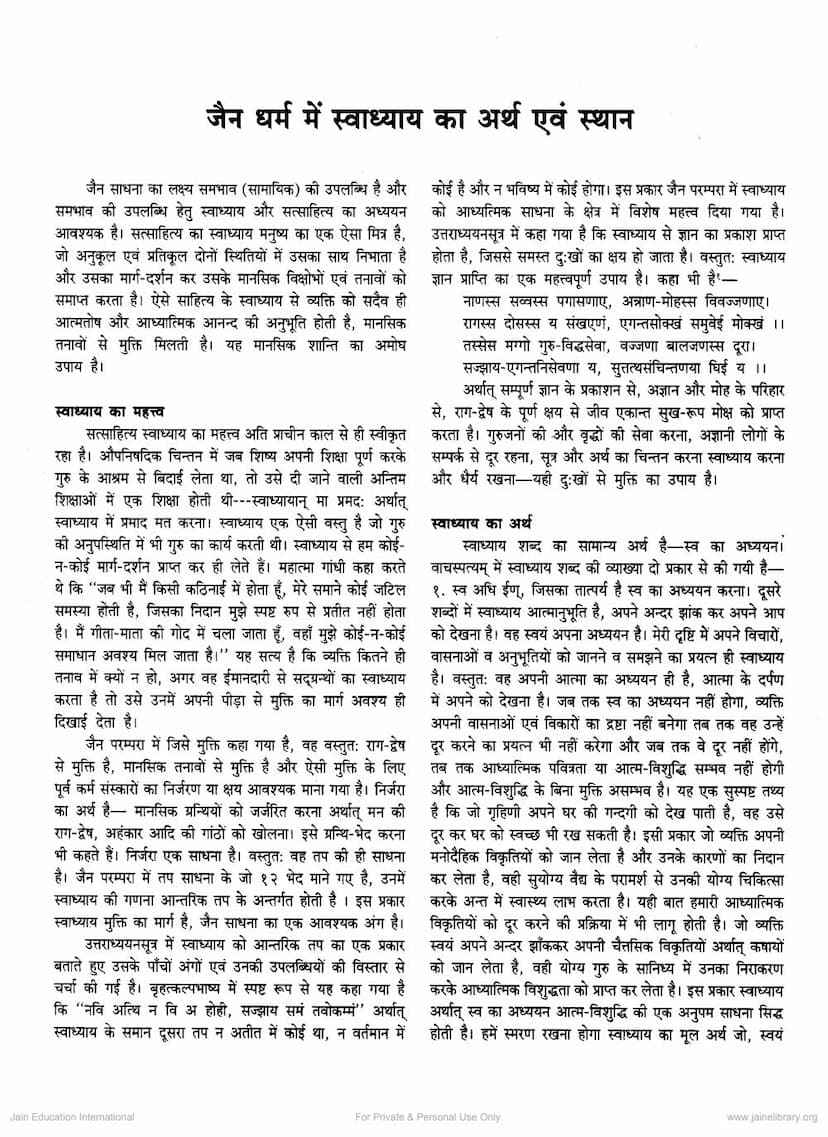Jain Dharm Me Swadhyay Ka Arth Evam Sthan
Added to library: September 2, 2025

Summary
Here's a comprehensive summary of the provided Jain text on the meaning and place of "Swadhyaya" (self-study) in Jainism, based on the provided PDF excerpts:
The Jain religious tradition places immense importance on Swadhyaya, defining it as a crucial spiritual practice for achieving Samabhava (equanimity) and ultimately, Moksha (liberation). The text draws heavily from scriptures like the Uttaradhyayana Sutra to elucidate its meaning and significance.
Meaning of Swadhyaya:
The term "Swadhyaya" is explained in two primary ways:
- "Swa adhi een": This interpretation signifies the study of the self. It's about introspection, looking within, and understanding one's own thoughts, desires, and experiences. It's akin to observing oneself in the mirror of the soul. Without this self-study, one cannot become a witness to their own inclinations and vices, nor can they strive to overcome them, which is essential for spiritual purity and liberation.
- "Su adhyaya": This means a good or noble chapter or study. From this perspective, Swadhyaya refers to the study of virtuous literature (Satsahitya). This good literature acts as a constant friend, guiding one through favorable and unfavorable times, alleviating mental disturbances and stress. Such study brings self-satisfaction, spiritual joy, and freedom from mental tension.
The Purpose and Scope of Swadhyaya:
The text emphasizes that not all reading constitutes Swadhyaya. True Swadhyaya involves:
- Studying one's own inner states: Understanding and observing one's own tendencies, emotions, and desires.
- Reading virtuous literature: Particularly literature that aids in understanding and overcoming mental afflictions (Kashayas) and impurities.
- Avoiding materialistic and distracting literature: Literature that fuels desires, worldly ambitions, disturbs the mind, and disrupts peace and equanimity is excluded from Swadhyaya.
- Cultivating inner peace and contentment: Swadhyaya is about engaging with texts that calm the mind and foster a sense of contentment.
The Five Limbs of Swadhyaya:
The Uttaradhyayana Sutra details five components of Swadhyaya:
- Vachana (Reading/Study): The act of studying scriptures, ideally in the presence of a teacher. In the modern context, this includes reading and studying the teachings of enlightened beings.
- Pratiprichhana (Questioning/Clarification): Seeking clarification on doubts or ambiguities regarding the studied text by asking questions to the teacher or through discourse.
- Parvartana (Recitation/Repetition): Repeatedly reciting or chanting previously studied texts. This strengthens memory and improves comprehension.
- Anupeksha (Contemplation/Meditation): Reflecting deeply on the meaning and implications of the studied subject matter. This leads to deeper understanding and personal realization.
- Dharmakatha (Religious Discourse/Teaching): Sharing the acquired knowledge with others through sermons or teachings. This practice not only benefits the listener but also reinforces the speaker's understanding and contributes to the propagation of the faith.
Benefits of Swadhyaya:
The text outlines numerous benefits derived from Swadhyaya, as described in Jain scriptures:
- Destruction of Ignorance (Jnana-avaraniya Karma): Swadhyaya removes the veil of false knowledge, leading to the acquisition of right knowledge (Samyak Jnana).
- Karma Nirjara (Shedding of Karmas): It helps in the shedding of karmic particles, a crucial aspect of liberation.
- Eradication of Doubts (Kankshamohaniya Karma): Through questioning and clarification, Swadhyaya resolves doubts related to scriptures, their meaning, and their combined import.
- Stabilization of Knowledge: Repetition (Parvartana) stabilizes the text and leads to an understanding of its nuances.
- Deepening of Understanding: Contemplation (Anupeksha) weakens the bondage of various karmas (except life-span karma), reduces intense emotional reactions, and shortens the duration of karmic effects. It accelerates the crossing of the cycle of birth and death.
- Propagation of Faith: Religious discourse (Dharmakatha) leads to karma nirjara and enhances the glory of the teachings (Pravachana). It also leads to the accumulation of meritorious karma.
- Intellectual Purity and Noble Sentiments: Acharya Akalank lists benefits like clarity of intellect, attainment of noble sentiments, protection of Jainism, resolution of doubts, refutation of opposing views, increase in austerity, and purification of faults.
The Place of Swadhyaya in the Sadhak's Life:
The Uttaradhyayana Sutra's description of a monk's daily routine highlights the integral role of Swadhyaya:
- A wise monk dedicates specific periods of both day and night to Swadhyaya, alongside meditation, alms-round, and attending to bodily needs.
- This routine suggests that a significant portion of a sadhak's life should be devoted to Swadhyaya, indicating its foundational importance in spiritual practice.
The Purpose of Swadhyaya (Prayojan):
The Sthananga Sutra elaborates on the five purposes of Swadhyaya:
- Attainment of Knowledge: To gain knowledge.
- Attainment of Right Knowledge: To acquire true and accurate knowledge.
- Incline Towards Right Conduct: To be guided towards ethical behavior.
- Release from Wrong Beliefs and Ignorance: To shed rigid doctrines and misunderstandings.
- Understanding Reality: To comprehend the true nature of things and existing states.
Current Relevance and Challenges:
The text laments the current state of reading habits in society, where people are often drawn to sensationalist and morally corrupting content in newspapers and other media. This tendency, it argues, has led to a decline in moral values. The author stresses the urgent need to promote and cultivate an interest in virtuous literature (Satsahitya) to uplift character and guide people towards the right path. True Swadhyaya is presented as the solution to these societal and individual moral challenges.
In essence, the text portrays Swadhyaya as a multifaceted practice within Jainism, encompassing both self-reflection and the study of scriptures. It is presented not merely as an academic pursuit but as a powerful spiritual tool for self-purification, karma reduction, and the ultimate realization of spiritual freedom.